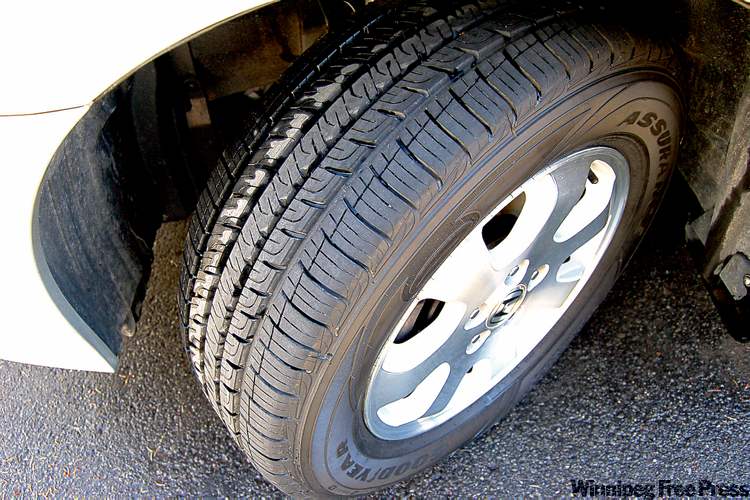BACKYARD MECHANIC: Use grease to diagnose car’s knocking noise
Use grease to diagnose car's knocking noise
Advertisement
Read this article for free:
or
Already have an account? Log in here »
To continue reading, please subscribe:
Monthly Digital Subscription
$0 for the first 4 weeks*
- Enjoy unlimited reading on winnipegfreepress.com
- Read the E-Edition, our digital replica newspaper
- Access News Break, our award-winning app
- Play interactive puzzles
*No charge for 4 weeks then price increases to the regular rate of $19.00 plus GST every four weeks. Offer available to new and qualified returning subscribers only. Cancel any time.
Monthly Digital Subscription
$4.75/week*
- Enjoy unlimited reading on winnipegfreepress.com
- Read the E-Edition, our digital replica newspaper
- Access News Break, our award-winning app
- Play interactive puzzles
*Billed as $19 plus GST every four weeks. Cancel any time.
To continue reading, please subscribe:
Add Free Press access to your Brandon Sun subscription for only an additional
$1 for the first 4 weeks*
*Your next subscription payment will increase by $1.00 and you will be charged $16.99 plus GST for four weeks. After four weeks, your payment will increase to $23.99 plus GST every four weeks.
Read unlimited articles for free today:
or
Already have an account? Log in here »
Hey there, time traveller!
This article was published 24/06/2011 (5251 days ago), so information in it may no longer be current.
QUESTION: I recently bought a 2006 Golf hatchback in excellent shape and very low mileage. The problem is there is a ‘knocking’ noise when turning. The gentleman I bought this from took it to the dealer and they informed him that it really wasn’t a problem. But to me it doesn’t seem right that this is something I just have to get used to. Just wondering if you have any idea or solution? Thanks.
ANSWER: There are several things that could make a knocking sound during a corner, including a loose wheel nut that allows the wheel to flex, or a worn suspension bushing that lets the suspension control arm touch the body of the car.
Parts only have to touch the slightest amount to make a loud noise. For example, I just diagnosed a knocking sound from the rear of a GM product that turned out to be a slightly bent control arm on the rear suspension. The bend allowed the control arm to touch the mount just enough to wear through the paint while cornering.

On your car, I would have the technician look at all parts for signs of contact, even the slightest amount. If you place grease on the suspected part, it will temporarily modify the knocking sound and that way you can confirm you have found the problem. One area that should be greased anyway and may cause a knock are the steering stops that limit how far the front wheels turn. If you’re turning a tight corner and these contact, they can make a grinding or knocking sound if not greased.
The noise could also be coming from an outer CV joint on the front axles. The wheels are points nearly straight ahead for most driving and will eventually wear an indent in the joint. When cornering, the CV joint balls roll back and forth over this worn spot and make a knocking sound. Typically, this sound is louder if you apply power while going through the corner.
Normally, a low-mileage car wouldn’t have trouble with CV-joint wear, but if an axle boot is cracked letting dirt and water into the joint, it can be damaged in just a couple hundred kilometres. A slight knocking sound from the CV joint isn’t dangerous, but it will get worse and eventually fail at an inopportune time. If this is the source of your knock, the bad joint should be replaced.
QUESTION: I have a 2004 Accord sedan V6. The original tires were 205/60/R16. I bought new 17-inch rims (Honda) and tires last summer (Uniroyal Tiger Paws – 215/55/R17). I love the look but I’m disappointed with the ride quality. Often it feels ‘clunky’ and I feel every bump. I expected a stiffer ride with the slightly smaller sidewall, but I’m wondering what impact the quality of the tire has? I did some Internet research and concluded that the Goodyear ComforTred tire might be a good replacement option. Before I make any sort of investment like that, I’d like to get a sense for what sort of difference I could expect? Should I get a wider size that’s closer to the original diameter but an even smaller sidewall and would it ‘fit’ without causing problems?
ANSWER: Tires last for so long that only tire dealers and manufacturers really have a good appreciation for the differences in tire wear and ride comfort. Your search of the Internet is a good place to start, and your choice of Goodyear’s ComforTred Touring tire line is a good one. The tire is designed for “Grand Touring” so it has an emphasis on performance with ride comfort.
There is a huge difference in ride quality between tires so use others’ experience. I would also test-drive a new Accord Coupe with 17-inch wheels. Check out the tire comfort during your drive. I wouldn’t recommend going to a wider tire. That will probably make the ride harsher and will likely cause interference with suspension and body parts on bumps and corners. Try to keep with the same width and overall diameter of the original tires whenever you replace them.
Jim Kerr is an experienced mechanic, instructor and member of the Automobile Journalists Association of Canada.
kerr.jim@sasktel.net

